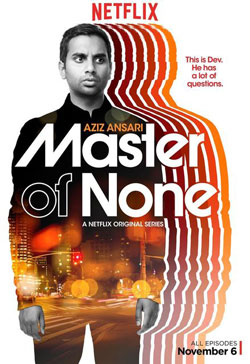While it’s best known for fulfilling all of our bingeing needs, Netflix’s foray into original content has made it more than just a streaming service. With series like Orange is the New Black and House of Cards achieving fan and critical praise despite never actually airing on television, Netflix has ushered in a new age of entertainment in which stories are no longer bound by the confines of cable.
Most recently, Netflix has presented us with Master of None, a quirky slice-of-life style show that takes some refreshing stylistic and tonal risks. The mastermind behind Master is Aziz Ansari of Parks and Recreation fame, who produced, wrote, and stars in the show as Dev, an Indian-American actor navigating life and relationships in New York City. All 10 episodes of the first season were released online on Friday, Nov. 6.
Master of None is old-fashioned in the way it is structured, rolling the credits at the beginning of the episode and using minimalist settings throughout. The comedic timing relies on awkward beats and snappy writing that is funny when you think about it but doesn’t necessarily click right away. It features an odd ball cast of characters and weirdly disjointed plots—three episodes in and I’m not exactly sure where the season is going overall.
But at the same time, it’s also completely revolutionary. Master of None is a platform for stories never told on television. It approaches parenthood (or lack thereof) from a fresh perspective, as the first episode chronicles Dev’s misadventures in babysitting and his anxiety over whether or not he wants children. The following episode examines the life of American-born children and their relationship to their immigrant parents. Cutting between flashbacks and present day, we see how much Dev’s parents sacrificed to get their family to America, while in the next scene, we watch Dev forego fixing his dad’s iPad to go see a movie with friends. Master starts to find its footing here, easily pulling on the heartstrings of any viewer that hasn’t called home in a while. The emotional beats are made even more poignant given that Ansari cast his real life parents to act as Dev’s family in the show.
While this casting choice was inspired, the acting otherwise has felt lackluster so far. Perhaps it’s a stylistic choice meant for this type of comedy, but you can almost see the script that the actors are reading from. Ansari is certainly capable of a more subtle performance than his on-the-nose portrayal of a smarmy schemer on Parks and Rec, but so far I’ve found myself missing Tom Haverford more often than not.
The supporting cast is decent, if for no other reason than the faces feel fresh and the characters don’t rely on recycled tropes. The friend group consisting of Dev, Denise (Lena Waithe), Arnold (Eric Wareheim), and Brian (Kelvin Yu) looks like an actual representation of the diversity one might find in New York City. After generations of shows like Friends that revolve around mostly white protagonists that never seem to have an issue with rent despite working in coffee shops, recent shows like Master of None have really captured the culture of the Big Apple.
The series is binge-able, for sure, but it is also an acquired taste. Ansari’s style of comedy is often to make things as awkward as possible for the viewer, holding pauses longer than necessary or dragging out cringe-worthy conversations. It’s not always as laugh-out-loud funny as it could be, but the humor lies in the perspective. Ansari breathes life into the show by tackling issues like racism and family in a fully modern voice, effortlessly appealing to Gen X by focusing plot points around iPads, Skype, and Uber.
Ansari is easily Master’s biggest draw, and without him I might skip it altogether—in terms of Netflix original comedies, I’m more partial to the goofy and optimistic Unbreakable Kimmy Schmidt. Still, Ansari’s unique voice and perspective make Master of None an effective storytelling platform, and if nothing else, these stories deserve an audience.
IMAGE COURTESY of sidereel.com




